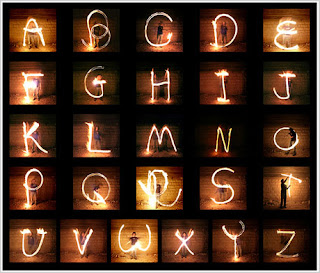I have recently answered my colleagues' questions regarding the development of students' writing skills. I propose a few writing activities that I believe they can be useful for EFL students. These activities are under the same theme, developing fluency in writing.
Freewriting is the first activity in which I believe it helps students to generate more ideas. It also helps students to look beyond the accuracy or the focus on correction, which should be focused at the later drafts of the paper. Freewriting helps students to gain fluency through writing continuously for 5 to 10 minutes without stipping. If students cannot write or think of anything to write, ask students to write "I dont have anything to write" until students have something else come to mind. This will also help students to develop their "voice" in their writing.
Dialogue journaling is another activity I am suggesting to my colleagues. This dialogue journaling is a fun activity in which it helps students to gain skill in responsing to students' questions and to clarify, to be more specific when writing. Teachers can also ask questions for students to clarify awkward sentences, generate more questions for students to think beyond thier ideas, and practice students about peer responses. This is a low stake writing, so students do not worry much about grammar and acuracy. Fluency is the key in this activity.
The last one is to ask students to keep daily journal. This can be appraoched thematically or randomly. This is also another low stake writing in which students do not need to show this to students if they do not want to. They can clip pages together when teachers ask students to submit.
I hope all these three activities will help EFL students to develop their writing skills.
Wednesday, June 24, 2009
Sunday, June 7, 2009
L2 writing has been synthesized into your hands

In accordance to Matsuda's article in 1999 on Composition Studies and ESL Writing: A Disciplinary Division of Labor, compositionists should start reading and studying about second language (L2) writing because of the growing of ESL student body in the university. This is the most recent and up-to-date book on L2 writing that everyone will find satisfactorily.
The editors have laid out the content thematically and pointed out the missing puzzles of the field for teacher-researcher scholars to work on the missing issues effectively.
This book is suitable for both novice and expert in the field. For novice, this book is a great place to start as the content of the book is most recent and has synthesized the references for easy traceback. Experts will also find this book a homage to the field. Some often leftout and overlooked issues are identified.
Also this is a great book for a supplementary text for introductory course in composition and L2 writing, teacher educator will be ableto use this book as well.
Matsuda, Paul Kei. "Composition Studies and ESL Writing: A Disciplinary Division of Labor." CCC 50.4 (1999): 699-721
Friday, June 5, 2009
My ongoing/current research topic

At this moment, I am in Thailand to attend an international conference, Asia TEFL. Before I come back, there has been an unresolved demonstrations and violent actions regarding the discontent of Thai people on government and elections. When I come back, there are signs everywhere in an attempt to reunite Thai people again.
In this connection, I have come up with a research project under the title -- Visual/Multimodal Rhetoric and Thai-Harmonious Identity Reconstruction.
Welcome to Composition and Second Language Writing Blog
If you like to compose, you come to the right place!!
This will be the place to discuss and share your stories and experiences through writing. Whether you are (becoming) experts or novices in composition and second language (L2) writing, this will be a good place to contribute and start the conversation on writing issues.
This will be the place to discuss and share your stories and experiences through writing. Whether you are (becoming) experts or novices in composition and second language (L2) writing, this will be a good place to contribute and start the conversation on writing issues.
Subscribe to:
Comments (Atom)